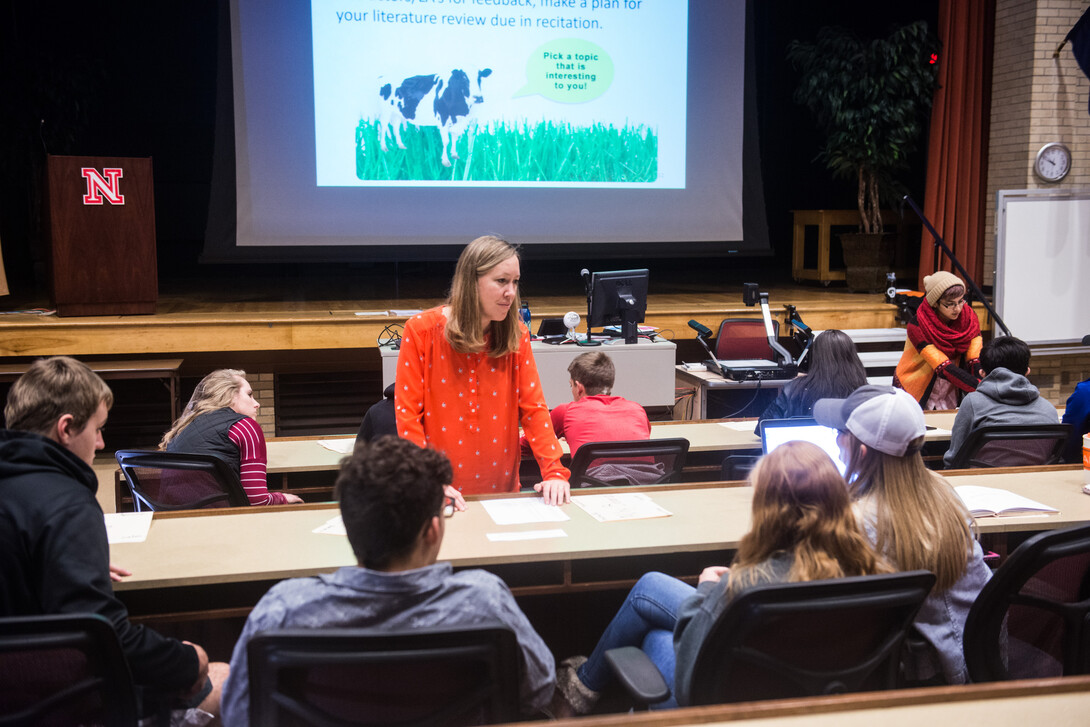
December 7, 2016
Lincoln, Neb. — Should the amount of water used for irrigation be restricted in Nebraska? Should corn ethanol be used for transportation fuel? Does prairie dog habitat in Nebraska need to be conserved? Each of these questions is incredibly complex with no right answer. Your answer to these questions may depend on several factors such as where you live, your profession or your personal values.
The role that science and values play in decision-making about complex issues is the focus of Science Literacy 101: Science and Decision-Making for a Complex World (SCIL 101). SCIL 101 is the foundational course for all students in the College of Agricultural Sciences and Natural Resources at the University of Nebraska–Lincoln. The course was offered for the first time this fall and has nearly 500 students currently enrolled.
According to SCIL 101 lead instructor Jenny Dauer, an assistant professor in the School of Natural Resources, the course introduces students to the scientific, social, economic, political, cultural and ethical dimensions of current issues related to food, energy, water and landscape systems. The course will focus on different salient issues each semester and is unique in that it is designed to emphasize the interdependencies among disciplines.
“A lot of the science knowledge we learn happens out of context of why we should truly care about it,” Dauer said. “In this course we use socioscientific issues as the background for students to practice systems-thinking and decision-making about difficult topics.”
The driving force for the increased focus on science informing one’s decision-making process stems from the science literacy initiative launched by the Institute of Agriculture and Natural Resources in 2012. The goal of the initiative is to foster a scientifically-literate society capable of making informed decisions grounded in science, technology, engineering and mathematics (STEM)-informed analysis of complex, real-world challenges associated with food, fuel, water, landscape and people issues. Becoming a scientifically-literate member of society begins with identifying and using scientific information as a student.
In SCIL 101 students work together in small groups in a classroom setting. The groups are presented with a question that they are asked to discuss and engage in evidence-informed decision-making. While the studenst may already have an opinion based on their life experiences, the focus of the course is helping students develop the skill set to explain and evaluate complex socioscientific issues using “systems-thinking” to distinguish the scientific information from values, ethics, culture, economics and politics surrounding the issue. The next step in the decision-making framework is for students to use scientific information to help understand the consequences of potential options for solving the problem.
It’s not uncommon for students to change their mind about a certain issue after evaluating the question with a science-informed approach.
“The class opened up my perspective on the subjects covered, and improved my decision-making ability,” said one SCIL 101 student.
After practicing their decision-making skills early on in the course, in the final five weeks of the semester, teams of students are asked to pick a socioscientific issue that defines a great challenge that our society faces, evaluate solutions, and use consensus values and scientific information to make a case for the best solution to their complex socioscientific problem. Their findings are shared during a public poster session the Thursday before finals week. This semester's poster sessions will take place Dec 8 in the first and second floor lobbies of Hardin Hall from 8-10:45 am and 2-4:45 pm.
Along with Dauer, other SCIL 101 lecturers are Dennis Ferraro, Cory Forbes, Thomas Powers, Brandi Sigmon and Elizabeth VanWormer. Each year up to 20 graduate and undergraduate learning assistants facilitate active-learning.
For more information about SCIL 101 or if you’re interested in becoming an instructor or learning assistant, visit http://casnr.unl.edu/science-literacy-101 or contact Dauer at 402-318-7349 or jenny.dauer@unl.edu.
Jenny DauerSchool of Natural Resources
402-318-7349
jenny.dauer@unl.edu







